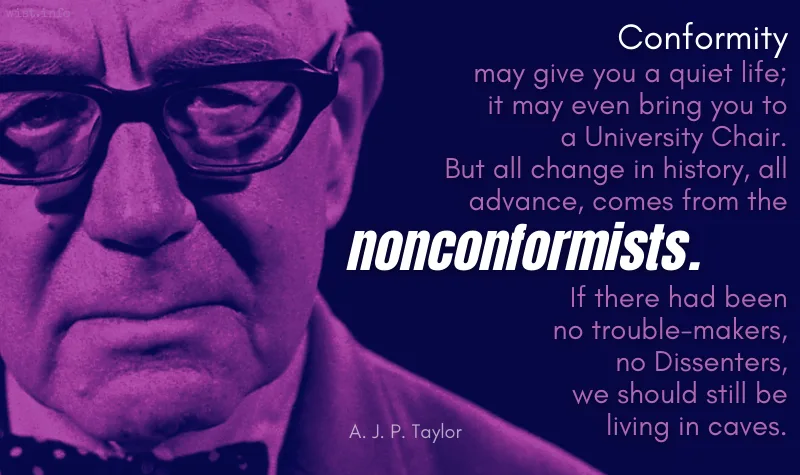WENDY. Where do you live?
PETER. Second to the right and then straight on till morning.
WENDY. What a funny address!
PETER. No, it isn’t.
J. M. Barrie (1860-1937) Scottish novelist and dramatist [James Matthew Barrie]
Peter Pan, Act 1 (1904, pub. 1928)
(Source)
In Barrie's novelization, Peter and Wendy, ch. 3 "Come Away, Come Away!" (1911), this is rendered:She asked where he lived.
“Second to the right,” said Peter, “and then straight on till morning.”
“What a funny address!”
Peter had a sinking feeling. For the first time he felt that perhaps it was a funny address.
“No, it isn’t,” he said.
Quotations about:
non-conformity
Note not all quotations have been tagged, so Search may find additional quotes on this topic.
What happens when a state tries to purge its state universities or a community tries to purge its public schools of alleged subversives? […] What happens is the demoralization and eventual corruption of the school system. This is not a momentary or even temporary affair; it is something the consequences of which may be felt for years. The search for subversives results in the intimidation of the independent, the original, the imaginative, and the experimental-minded. It discourages independence of thought in teachers and students alike. It discourages the reading of books that may excite the suspicion of some investigator or some Legionnaire. It discourages the discussion of controversial matters in the classroom, for such discussion may be reported, or misreported, and cause trouble. It creates a situation where first-rate minds will not go into teaching or into administration and where students therefore get poor teaching. In the long run it will create a generation incapable of appreciating the difference between independence of thought and subservience. In the long run it will create a generation not only deprived of liberty but incapable of enjoying liberty.
Henry Steele Commager (1902-1998) American historian, writer, activist
“Free Enterprise in Ideas,” Freedom, Loyalty, Dissent (1954)
(Source)
Originally published in the Saturday Review (1952), based on a speech to the Advertising Council's American Round Table, New York City (1951).
Conformity may give you a quiet life; it may even bring you to a University Chair. But all change in history, all advance, comes from the nonconformists. If there had been no trouble-makers, no Dissenters, we should still be living in caves.
To write in plain, vigorous language one has to think fearlessly, and if one thinks fearlessly one cannot be politically orthodox.
George Orwell (1903-1950) English writer [pseud. of Eric Arthur Blair]
“The Prevention of Literature,” Polemic (Jan 1946)
(Source)
But since it is no more in a Man’s Power to think than to look like another, methinks all that should be expected from me is to keep my Mind open to Conviction, to hear patiently and examine attentively whatever is offered me for that end; and if after all I continue in the same Errors, I believe your usual Charity will induce you rather to pity and excuse than blame me.
Benjamin Franklin (1706-1790) American statesman, scientist, philosopher, aphorist
Letter to Josiah and Abiah Franklin (13 Apr 1738)
(Source)
His parents.
It is easy in the world to live after the world’s opinion; it is easy in solitude to live after our own; but the great man is he who, in the midst of the crowd, keeps with perfect sweetness the independence of solitude.
I believe that that community is already in process of dissolution where each man begins to eye his neighbor as a possible enemy, where non-conformity with the accepted creed, political as well as religious, is a mark of disaffection; where denunciation, without specification or backing, takes the place of evidence; where orthodoxy chokes freedom of dissent; where faith in the eventual supremacy of reason has become so timid that we are not enter our convictions into the open list, to win or lose. Such fears as these are a solvent which can eat out the cement that binds the stones together; they may in the end subject us to a despotism as evil as any that we dread; and they can be allayed only in so far as we refuse to proceed on suspicion, and trust one another until we have tangible ground for misgiving,
Learned Hand (1872-1961) American jurist
“A Plea for the Open Mind and Free Discussion,” speech, University of the State of New York, Albany (1952-10-24)
(Source)
Our dangers, as it seems to me, are not from the outrageous but from the conforming; not from those who rarely and under the lurid glare of obloquy upset our moral complaisance, or shock us with unaccustomed conduct, but from those, the mass of us, who take their virtues and their tastes, like their shirts and their furniture, from the limited patterns which the market offers.
Learned Hand (1872-1961) American jurist
“The Preservation of Personality,” speech, commencement, Bryn Mawr College (1927-06-02)
(Source)
First printed in the Bryn Mawr Alumnae Bulletin (Oct 1927).











